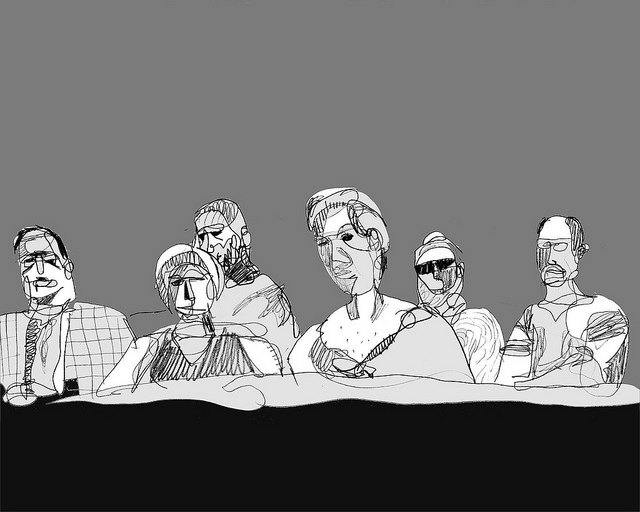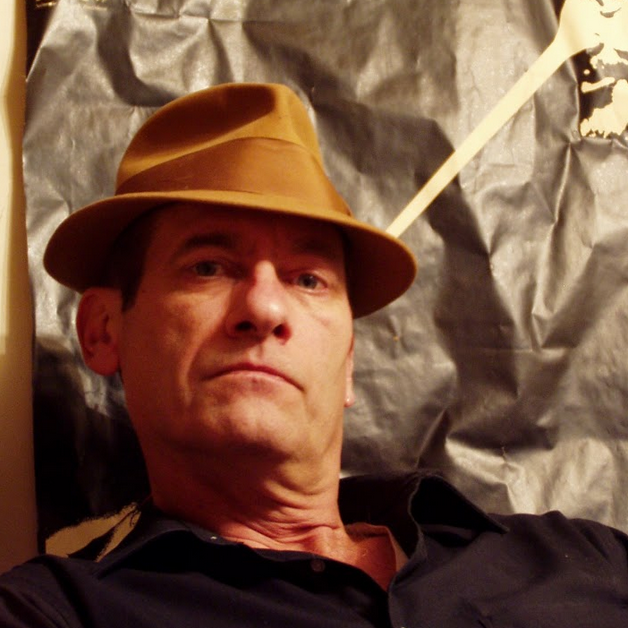Flash Nonfiction by JLSchneider
We Do Not Document Time

Jesse “Wes” Lewis is on trial for sale and possession. I’m a jury alternate, and my buddy Ray is dying down in Florida. I really want to get there to say goodbye, but New York State has me by the balls because I’ve already ducked them once. Besides, Juror Number 12 sitting next to me for four days is a pixie blonde with sweet-smelling breasts and thong underwear I’ve seen at the small of her back when she leans forward to listen to testimony, rife with all the manufactured sexuality of television.
It’s summer, I have some free time from my ailing carpentry business, and the State isn’t making their case very well. Based on their evidence, if I were voting, which I can’t as an alternate, I’d have to acquit, even though Wes is obviously guilty and he’s from my hometown and I don’t want him around anymore than the prosecutor does. But there are some things more important than guilt or innocence. Reason. Facts. Evidence in support of an assertion. Wes’s acquittal, if it comes to that, seems like a small price to pay for not descending into the primal goo of mob rule.
Early on, however, I can see where this is going. The Foreperson is an old woman who on the surface acts like a benign grandmother—she’s actually knitting in the jury room—but who says at the beginning of the trial, If I’m going to initiate conversation, I better get more than silence in return.
So sweet the face of tyranny, the cuddled dictatorship of groups, emotion, incorporation nesting under her shawl. It’s a smell, like the smell that comes back to me when the prosecutor mentions Wes’s cocaine sales, the acrid dose to the amygdala when I was young. Not a fat-in-the-nose smell, but a thin, spreading numbness when I used to rub the last grains of coke on my gums—a social smell, the dark fascist odor of inclusion, sweet and sour and imperious.
I haven’t seen Ray in years. He was one of my best friends in life, the original nonconformist and Korean War vet who burned his Silver Star at The Wall in D.C. during Vietnam. Twenty years ago, we met purely by chance in a construction bar in Providence, Rhode Island, after work one day, he coming from his site and me from mine. Older than me by a generation, he was an artist and sculptor and carpenter and teacher who taught in universities all over the United States and abroad, who’s now broke and dying down in Florida with prostate cancer in his sister’s guest room, and the clock is ticking.
As I watch Wes sitting next to his lawyer in his obvious suit, I imagine Wes is thinking about time, too, future versions of it, where it’s going to be spent. My Verification of Jury Duty Attendance card reads: We do not document time.
For four days, I’m listening to lawyers and smelling the Pixie and thinking about Ray, and on the last day of the trial, I suddenly remember a dream from a long time ago, when I still lived in Providence, in which a voice told me the meaning of life. The voice had the stentorian tone of immortal certainty, its authority calling from every direction yet speaking only to me, so I knew it was true. But the words were in Latin, and I don’t understand Latin. And because Latin is so foreign to my ear, I couldn’t even write it down phonetically in the morning.
The last time I saw Ray, he was heading out of Providence with all his worldly possessions packed into his geriatric Mazda pickup, the “Seussmobile,” we called it, because he’d built numerous contraptions of cap on the back which looked like teetering boxes at a Whoville Christmas. He had sold all his tools—there is no sadder carpenter’s fate—because he’d been unemployed for a year (he had a tendency to piss off his bosses, blue- and white-collar, one of his endearing traits), had run out of money, and was heading to Seattle to stay with one of his children. He’d always been a wanderer, yet I expected, hoped, to see him again. Several months later, I, too, left Providence and moved to upstate New York, where one day I would be stuck in a trial of a petty coke dealer with an imperious grandmother and a pixie blonde.
I haven’t seen Ray for ten years, during which time I’ve known the meaning of life but haven’t been able to decipher it. It’s like a really bad trailer park version of the Cassandra complex, as incomprehensible as Wes’s conviction, which stuns me, making me wonder if I’ve seen the same trial as my fellow jurors.
After the verdict, on the forty-minute drive home from the county courthouse, it occurs to me that the State, of all things, has verified my isolation from my peers. Ray did the same thing. By example, he gave me the invaluable gift of a singular self moving through the world; his life was permission to not join the folly of my fellow human beings.
That night, I call Ray. His youngest daughter tells me his funeral will be next week.
Art Information
- "Jury 1" © Matt Freedman; Creative Commons license.
 JLSchneider is a carpenter and an adjunct professor of English at a small community college in upstate New York. Winner of the Whispering Prairie Press Writers Nonfiction Contest, the New Millennium Writings Award for Creative Nonfiction, and the Briar Cliff Review Creative Nonfiction Contest, his essays have also appeared in Solstice Literary Magazine, Southeast Review, Mochila Review, and Boulevard.
JLSchneider is a carpenter and an adjunct professor of English at a small community college in upstate New York. Winner of the Whispering Prairie Press Writers Nonfiction Contest, the New Millennium Writings Award for Creative Nonfiction, and the Briar Cliff Review Creative Nonfiction Contest, his essays have also appeared in Solstice Literary Magazine, Southeast Review, Mochila Review, and Boulevard.
He was nominated for a Pushcart Prize for fiction in 2013 and for nonfiction in 2014. His poetry collection It’s Strange Here will be published in early 2016 by Vine Leaves Press.
You can visit him online at JLSchneider's website.
